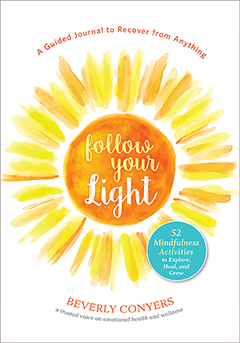
"A spiritual life is one lived in that awareness and growth."

Other titles you may like.
Visit Recovery Road to view and listen to all the episodes.
Episode 56 -- October 26, 2020
Mindfulness for Healing Through Forgiveness
Beverly Conyers, author of Find Your Light: Practicing Mindfulness to Recover from Anything, just published Follow Your Light: A Guided Journal to Recover from Anything. Here are two exercises from the journal about forgiveness, something we can all examine a little more closely in ourselves in our recovery journeys. Grab a notebook or buy the journal—make sure to give yourself room to write out your exercises as part of your therapeutic process. This mindfulness will help you discover memories you may have forgotten, but may still need to consider forgiving.
This excerpt is from Follow Your Light by Beverly Conyers and has been edited for brevity.
Healing through Forgiveness
Resentment is a heavy burden to bear. When we carry a grudge or harbor unresolved anger, we compromise our physical and emotional health. Our worldview gets darker, and the pain of the past spills into the present. Compassion can help us build a bridge from anger to forgiveness.
Forgiveness is never about pretending that we weren't hurt or that what we suffered doesn't matter. It isn't about forgetting. Instead, forgiveness is about seeing others' transgressions through the prism of compassion, understanding that all people are flawed. More importantly, it's about accepting that what is done is done and then choosing to let anger go. Forgiveness frees us from the burden of past hurts so we are better able to live more contentedly in the present.
Exercise:
Write about someone who hurt you in the past. Explain who this person was, where you were, how old you were, and what exactly happened. How do you feel about this person today? If you have found forgiveness, how did that happen? If you are holding on to anger, what steps could you take to let it go?
You can pause the podcast now or go back after you've listened to the whole episode.
Forgiving Ourselves
A common characteristic of people in recovery is the tendency to judge ourselves harshly. We replay our mistakes again and again in our head, telling ourselves that we are terrible people who are undeserving of compassion or forgiveness. But beating ourselves up doesn't teach us anything. It just keeps us stuck in an unhealthy cycle of self-criticism and self-punishment.
Making amends, as recommended in the Twelve Steps, is an important step in breaking the cycle. When we make a sincere effort to right a wrong, we begin to learn from our mistakes. We try to figure out why we behaved as we did and what we can do to avoid repeating the mistake. This kind of helpful self-assessment is possible only when we abandon self-criticism and replace it with self-compassion and self-forgiveness.
Exercise:
Think of mistakes you've made that have led you to feel shame. Now, imagine that your dearest friend made those same mistakes. He or she is suffering deeply and filled with shame. Write him or her a letter of comfort, love, and compassion. When you are finished, cross out your friend's name and write in your own.
About the Author:
Author Beverly Conyers--one of the most respected voices in wellness and recovery--has guided hundreds of thousands of readers through the process of recognizing family roles in addiction, healing shame, building healthy relationships, releasing trauma, focusing on emotional sobriety, as well as acknowledging self-sabotaging behaviors, addictive tendencies, and substance use patterns. With her newest work, Conyers shows us how the practice of mindfulness can be a game-changing part of recovering from any- and everything. She is the author of Find Your Light: Practicing Mindfulness to Recover from Anything (Nov. 2019), and Follow Your Light: A Guided Journal to Recover from Anything (Aug. 2020) as well as Addict in the Family: Stories of Loss, Hope, and Recovery (2003), Everything Changes: Help for Families of Newly Recovering Addicts (2009), The Recovering Heart: Emotional Sobriety for Women (2013).
© 2020 by Beverly Conyers
All rights reserved




